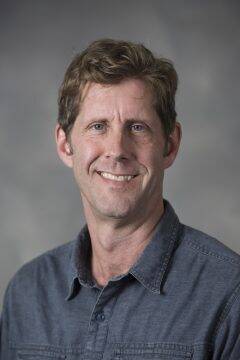Phillip Motley, faculty fellow for community-based learning, shares his expertise and efforts in faculty development and recruitment.
Professor of Communication Design Phillip Motley is a champion for community-based learning. With a passion for bridging academia and community engagement, Motley is pivotal in recruiting faculty members to integrate community-based learning into their courses while providing guidance and support to those who have already begun implementing it within their courses.

But what exactly is community-based learning? Motley, the faculty fellow for community-based learning, explains that it’s a pedagogical approach that immerses students in real-world service experiences, allowing them to address a community need using what they have learned in the classroom.
At Elon, community-based learning is embedded within the service Experiential Learning Requirement (ELR), one of the five Elon Experiences, with students required to complete two ELRs to graduate. One way to satisfy one of the two required ERLs is through a community-based learning class. During these courses, students engage in at least 40 hours of service activities, encompassing everything from project preparation to direct service and reflection.
Faculty members can apply for approval to teach a community-based learning course that would fulfill one of the two required ELRs for students. Motley empowers faculty to take ownership of how they teach their course, just as he has done.
“When I chose to teach my class as a community-based learning class, I’m buying into a pedagogy or a way of teaching the class that teaches the students, in my case, about communications and communication design, through engagement with the community,” Motley stated. “They might work on a project producing some kind of design materials, website, or something for a community partner. During the course, they’d learn about graphic or website design, etc. But doing it by providing a service to the community, whoever that community partner might be.”
Motley’s expertise in community-based learning comes from his experiences implementing it within his classes long before becoming a faculty fellow in 2020. He has taught community-based learning courses within the Interactive Media graduate-degree program. Students within the program travel internationally to work with a community or nonprofit organization. The catalog of countries visited by the program is extensive, including Nicaragua, Costa Rica, Colombia, Puerto Rico, Barbados, and the Dominican Republic.
“We call it global service learning, global community-based learning, or international service because it combines two high-impact practices–study abroad and community engagement or service learning,” Motley said. Different places call it by different terms, but essentially, they mean the same thing.”
However, these experiences are more than just an academic learning opportunity with real-life application; they are transformative, allowing students to foster personal growth and civic responsibility.
“The students learned an enormous amount not only about a professional experience or learning how to work in a team, but they learned deeply about the community and the culture within the country,” Motley said. “They get to know people in ways that they probably wouldn’t if they were just a tourist because they’re working with natives of the country one-on-one for seven or eight days. They are building meaningful relationships. It’s a short amount of time they are in these countries, but it’s still a relationship that, honestly, you don’t get when you just travel somewhere,” he shared.
Another key role of Motley’s faculty fellow role is faculty development with a focus on guiding faculty members on how to teach community-based learning. One notable program Motley has continued is the Community-Based Learning Scholars Program. The year-long program teaches faculty about community-based learning and helps them understand how it works within the classroom. During the program, they are encouraged to transform a course they are currently teaching or a future course into a community-based learning class.
Another initiative that he has spearheaded is the new Community-Based Learning Course Development Grant. These grants provide funding for faculty members to redesign a course taught using a traditional pedagogy into a community-based learning course, further incentivizing engagement. He has also built campus partnerships with the staff within the Kernodle Center for Civic Life to assist in connecting faculty members with community partners.
In addition, Motley emphasizes that the impact of community-based learning extends beyond faculty and students to the University’s relationship with the Burlington and Alamance county communities. Through community engagement, the approach of community-based learning strengthens the university’s reputation and relationship with the surrounding community. He believes these experiences are essential for breaking down barriers between the university and the community.
“If we aren’t careful, Elon could gain a reputation as a private institution within a special little bubble,” Motley explained. “I think when we engage with the community by taking students into the community to work with organizations or better yet, when we bring the community here, maybe into the classroom or host a guest speaker, we’re working against the community’s seeing us in that negative light,” he said.
As Motley approaches the end of his fourth year as a faculty fellow, his dedication to advancing community-based learning at Elon remains unwavering. He has committed to serving within the fellowship for an additional year. During his additional year as a faculty fellow, Motley will be instrumental in working on the University’s upcoming reapplication for the Carnegie Foundation’s Elective Classification for Community Engagement that is due in 2026. Receiving the classification certifies that Elon meets the standard of community engagement as a university, ensuring that the university remains a recognized leader in community-based learning.
Motley hopes to see a continued focus on strengthening the University’s connections with the community by nurturing community partnerships and promoting a culture of collaboration.


